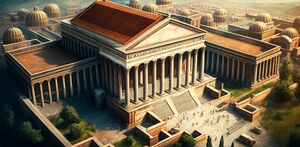Temple of Mors: Difference between revisions
No edit summary |
mNo edit summary |
||
| Line 6: | Line 6: | ||
The Temple has been renovated countless times since its original inception, but the original structure still stands. Its walls and arches are made of limestone and smooth white marble, and the roof is covered in a mosaic of glass and silver tiles. It is said to be a sight to behold, both day and night, as the silver tiles reflect the moonlight and stars. | The Temple has been renovated countless times since its original inception, but the original structure still stands. Its walls and arches are made of limestone and smooth white marble, and the roof is covered in a mosaic of glass and silver tiles. It is said to be a sight to behold, both day and night, as the silver tiles reflect the moonlight and stars. | ||
Throughout the 16th and 17th century it became the symbol of the [[ | Throughout the 16th and 17th century it became the symbol of the [[Children of Mors]]' dominance over the [[Cedrism|Cedrist Faith]], which started to challenge the Kaiser's position and authority over both the Faith and - worse - the State. The power and position of the Temple has been increasingly challenged by [[Kaiseress Salome]] and her supporters during the latter part of the 17th century. | ||
[[Category: Cedrism]][[Category: Shireroth]] | [[Category: Cedrism]][[Category: Shireroth]] | ||
[[Category:Places of worship]] | [[Category:Places of worship]] | ||
Latest revision as of 11:54, 12 April 2023
Within the Ancient City is the Temple of Mors, possibly the oldest building in Shirekeep after Raynor's Keep itself. The Temple is the most isolated building in the Ancient City, it being considered horribly bad luck to be close to a Temple of Mors for too long.
Inside are statues and paintings of the Kaisers of Shireroth, with the most prominent one being that of Kaiser Raynor I, the first Kaiser of Shireroth. The complexes house several tombs and crypts, serving as the final resting place of the deceased Kaisers before 1561 AN, when Kaiser Leto III ordered the creation of the Raynor Mausoleum (which on its turn was replaced by the Valley of Mors by Kaiser Gaelen IV). Living Kaisers enter it only once, on their coronation day.
The Temple has been renovated countless times since its original inception, but the original structure still stands. Its walls and arches are made of limestone and smooth white marble, and the roof is covered in a mosaic of glass and silver tiles. It is said to be a sight to behold, both day and night, as the silver tiles reflect the moonlight and stars.
Throughout the 16th and 17th century it became the symbol of the Children of Mors' dominance over the Cedrist Faith, which started to challenge the Kaiser's position and authority over both the Faith and - worse - the State. The power and position of the Temple has been increasingly challenged by Kaiseress Salome and her supporters during the latter part of the 17th century.
